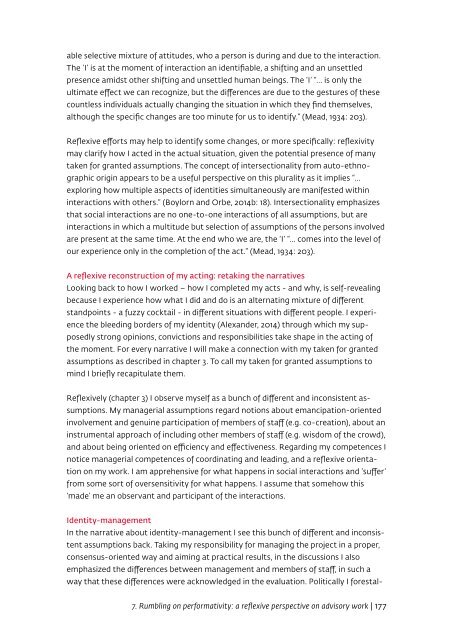Rumbling on performativity_Frits Simon
Rumbling on performativity_Frits Simon
Rumbling on performativity_Frits Simon
Create successful ePaper yourself
Turn your PDF publications into a flip-book with our unique Google optimized e-Paper software.
able selective mixture of attitudes, who a pers<strong>on</strong> is during and due to the interacti<strong>on</strong>.<br />
The ‘I’ is at the moment of interacti<strong>on</strong> an identifiable, a shifting and an unsettled<br />
presence amidst other shifting and unsettled human beings. The ‘I’ “… is <strong>on</strong>ly the<br />
ultimate effect we can recognize, but the differences are due to the gestures of these<br />
countless individuals actually changing the situati<strong>on</strong> in which they find themselves,<br />
although the specific changes are too minute for us to identify.” (Mead, 1934: 203).<br />
Reflexive efforts may help to identify some changes, or more specifically: reflexivity<br />
may clarify how I acted in the actual situati<strong>on</strong>, given the potential presence of many<br />
taken for granted assumpti<strong>on</strong>s. The c<strong>on</strong>cept of intersecti<strong>on</strong>ality from auto-ethnographic<br />
origin appears to be a useful perspective <strong>on</strong> this plurality as it implies “…<br />
exploring how multiple aspects of identities simultaneously are manifested within<br />
interacti<strong>on</strong>s with others.” (Boylorn and Orbe, 2014b: 18). Intersecti<strong>on</strong>ality emphasizes<br />
that social interacti<strong>on</strong>s are no <strong>on</strong>e-to-<strong>on</strong>e interacti<strong>on</strong>s of all assumpti<strong>on</strong>s, but are<br />
interacti<strong>on</strong>s in which a multitude but selecti<strong>on</strong> of assumpti<strong>on</strong>s of the pers<strong>on</strong>s involved<br />
are present at the same time. At the end who we are, the ‘I’ “… comes into the level of<br />
our experience <strong>on</strong>ly in the completi<strong>on</strong> of the act.” (Mead, 1934: 203).<br />
A reflexive rec<strong>on</strong>structi<strong>on</strong> of my acting: retaking the narratives<br />
Looking back to how I worked – how I completed my acts - and why, is self-revealing<br />
because I experience how what I did and do is an alternating mixture of different<br />
standpoints - a fuzzy cocktail - in different situati<strong>on</strong>s with different people. I experience<br />
the bleeding borders of my identity (Alexander, 2014) through which my supposedly<br />
str<strong>on</strong>g opini<strong>on</strong>s, c<strong>on</strong>victi<strong>on</strong>s and resp<strong>on</strong>sibilities take shape in the acting of<br />
the moment. For every narrative I will make a c<strong>on</strong>necti<strong>on</strong> with my taken for granted<br />
assumpti<strong>on</strong>s as described in chapter 3. To call my taken for granted assumpti<strong>on</strong>s to<br />
mind I briefly recapitulate them.<br />
Reflexively (chapter 3) I observe myself as a bunch of different and inc<strong>on</strong>sistent assumpti<strong>on</strong>s.<br />
My managerial assumpti<strong>on</strong>s regard noti<strong>on</strong>s about emancipati<strong>on</strong>-oriented<br />
involvement and genuine participati<strong>on</strong> of members of staff (e.g. co-creati<strong>on</strong>), about an<br />
instrumental approach of including other members of staff (e.g. wisdom of the crowd),<br />
and about being oriented <strong>on</strong> efficiency and effectiveness. Regarding my competences I<br />
notice managerial competences of coordinating and leading, and a reflexive orientati<strong>on</strong><br />
<strong>on</strong> my work. I am apprehensive for what happens in social interacti<strong>on</strong>s and ‘suffer’<br />
from some sort of oversensitivity for what happens. I assume that somehow this<br />
‘made’ me an observant and participant of the interacti<strong>on</strong>s.<br />
Identity-management<br />
In the narrative about identity-management I see this bunch of different and inc<strong>on</strong>sistent<br />
assumpti<strong>on</strong>s back. Taking my resp<strong>on</strong>sibility for managing the project in a proper,<br />
c<strong>on</strong>sensus-oriented way and aiming at practical results, in the discussi<strong>on</strong>s I also<br />
emphasized the differences between management and members of staff, in such a<br />
way that these differences were acknowledged in the evaluati<strong>on</strong>. Politically I forestal-<br />
7. <str<strong>on</strong>g>Rumbling</str<strong>on</strong>g> <strong>on</strong> <strong>performativity</strong>: a reflexive perspective <strong>on</strong> advisory work | 177



